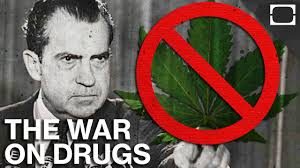 The question has been hotly debated for decades now. Should drug offenders be sent to prison or rehabilitation?
The question has been hotly debated for decades now. Should drug offenders be sent to prison or rehabilitation?
It was President Richard Nixon who coined the phrase “war on drugs” as he launched a new effort to stop the growing number of addicts as well as the ever increasing flow of illegal narcotics into this country. Most forget that Nixon’s original goal was to prevent new addicts and rehabilitate those who were already addicted. That goal was lost in the phrase “war on drugs” which criminalizing drug use and abuse.
President Reagan established the Anti-Drug Abuse Act of 1986. According to the Human Rights Watch, legislation like this led to the extreme increase in drug offense imprisonment and “increasing racial disproportions among the arrestees”. The number of incarcerated drug offenders has increased twelvefold since 1980. In 2000, 22 percent of those in federal and state prisons were convicted on drug charges. In 2011, 55.6% of the 1,131,210 sentenced prisoners in state prisons were being held for violent crimes (this number excludes the 200,966 prisoners being held due parole violations, of which 39.6% were re-incarcerated for a subsequent violent crime). Also in 2011, 3.7% of the state prison population consisted of prisoners whose highest conviction was for drug possession (again excluding those incarcerated for parole violations of which 6.0% were re-incarcerated for a subsequent act of drug possession).
The United States has the largest prison population in the world, and the highest per-capita incarceration rate. While the United States continues to incarcerate higher number of drug offenders, the drug problem in this country has not abated. In fact, it has shifted not ended. Currently, the abuse of prescription opioids is a major problem that prompted Congressional oversight of doctors and their issuing prescriptions.
Is there a better way to tackle this problem? Perhaps. The medical community regards drug and alcohol as addictions. If that is the case, why do we not treat them as medical issues rather than criminal issues?
Research has found that sending offenders with a history of drug and alcohol abuse to addiction treatment programs rather than institutionalizing them in jail or prison is not only the humanitarian choice but it will cut crime rates and save billions of dollars.
In a time when the federal government has a debt in the trillions, it seems unethical to ignore the benefits and cost savings of helping people get the medical care they need rather than incarceration that will only worsen everyone’s problems.
Ever since President Nixon declared a “war on drugs”, the issue has become politicized with conservatives favoring criminal penalties and liberals preferring treatment. But this isn’t a political issue. It’s a human issue. Lives are lost in the meantime. The medical community believes this is a medical issue that should be treated as a disease. We know the “war on drugs” hasn’t worked, why not try treating the problem as a disease?
